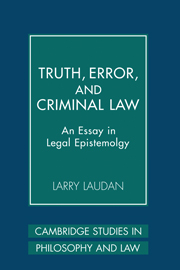Book contents
- Frontmatter
- Contents
- Preface
- Abbreviations and Acronyms Used
- 1 Thinking about Error in the Law
- PART I THE DISTRIBUTION OF ERROR
- PART II FLAWED RULES OF EVIDENCE AND PROCEDURE
- 5 Evaluating Evidence and Procedures
- 6 Silent Defendants, Silent Witnesses, and Lobotomized Jurors
- 7 Confessions, Poison Fruit, and Other Exclusions
- 8 Double Jeopardy and False Acquittals: Letting Felons and Judges off the Hook?
- 9 Dubious Motives for Flawed Rules: The Clash between Values
- Index
6 - Silent Defendants, Silent Witnesses, and Lobotomized Jurors
Published online by Cambridge University Press: 05 June 2012
- Frontmatter
- Contents
- Preface
- Abbreviations and Acronyms Used
- 1 Thinking about Error in the Law
- PART I THE DISTRIBUTION OF ERROR
- PART II FLAWED RULES OF EVIDENCE AND PROCEDURE
- 5 Evaluating Evidence and Procedures
- 6 Silent Defendants, Silent Witnesses, and Lobotomized Jurors
- 7 Confessions, Poison Fruit, and Other Exclusions
- 8 Double Jeopardy and False Acquittals: Letting Felons and Judges off the Hook?
- 9 Dubious Motives for Flawed Rules: The Clash between Values
- Index
Summary
Today as in the past there are students of our penal system who look upon immunity [that is, the defendant's privilege against self-incrimination] as a mischief rather than a benefit, and who would limit its scope, or destroy it altogether. No doubt there would remain the need to give protection against torture, physical or mental…. Justice, however, would not perish if the accused were subject to a duty to respond to orderly inquiry.
– Justice Benjamin Cardozo (1937)If all the criminals of every class had assembled, and framed a system after their own wishes, is not this rule [of silence] the very first which they would have established for their security?
– Jeremy BenthamThe Fifth Amendment's privilege against self-incrimination … is not designed to enhance the reliability of a fact-finding determination but stands in the Constitution for entirely independent reasons.
– U.S. Supreme Court (1986)Silence and Truth Seeking
In the following four chapters, I am going to examine a few selected rules of evidence and procedure to see whether they are truth promoting or truth thwarting. Those I have chosen to look at are particularly problematic. When I find rules wanting from this point of view, my thought experiment will require that I explore alternatives. I will begin by discussing a broad family of evidence rules that address the questions of who is obliged to give testimony and what inferences the jury should be entitled to make when such testimony is not forthcoming.
- Type
- Chapter
- Information
- Truth, Error, and Criminal LawAn Essay in Legal Epistemology, pp. 147 - 170Publisher: Cambridge University PressPrint publication year: 2006

